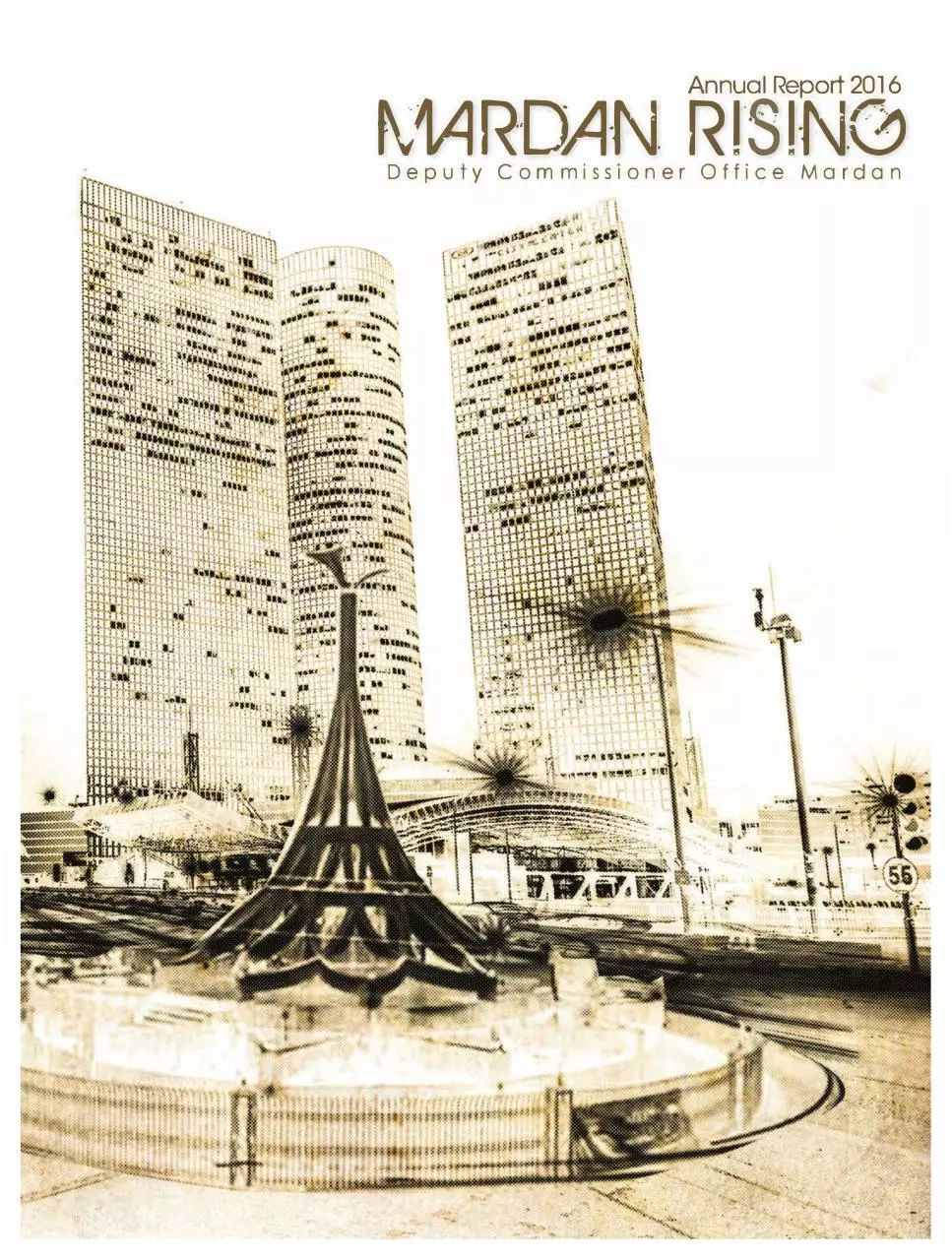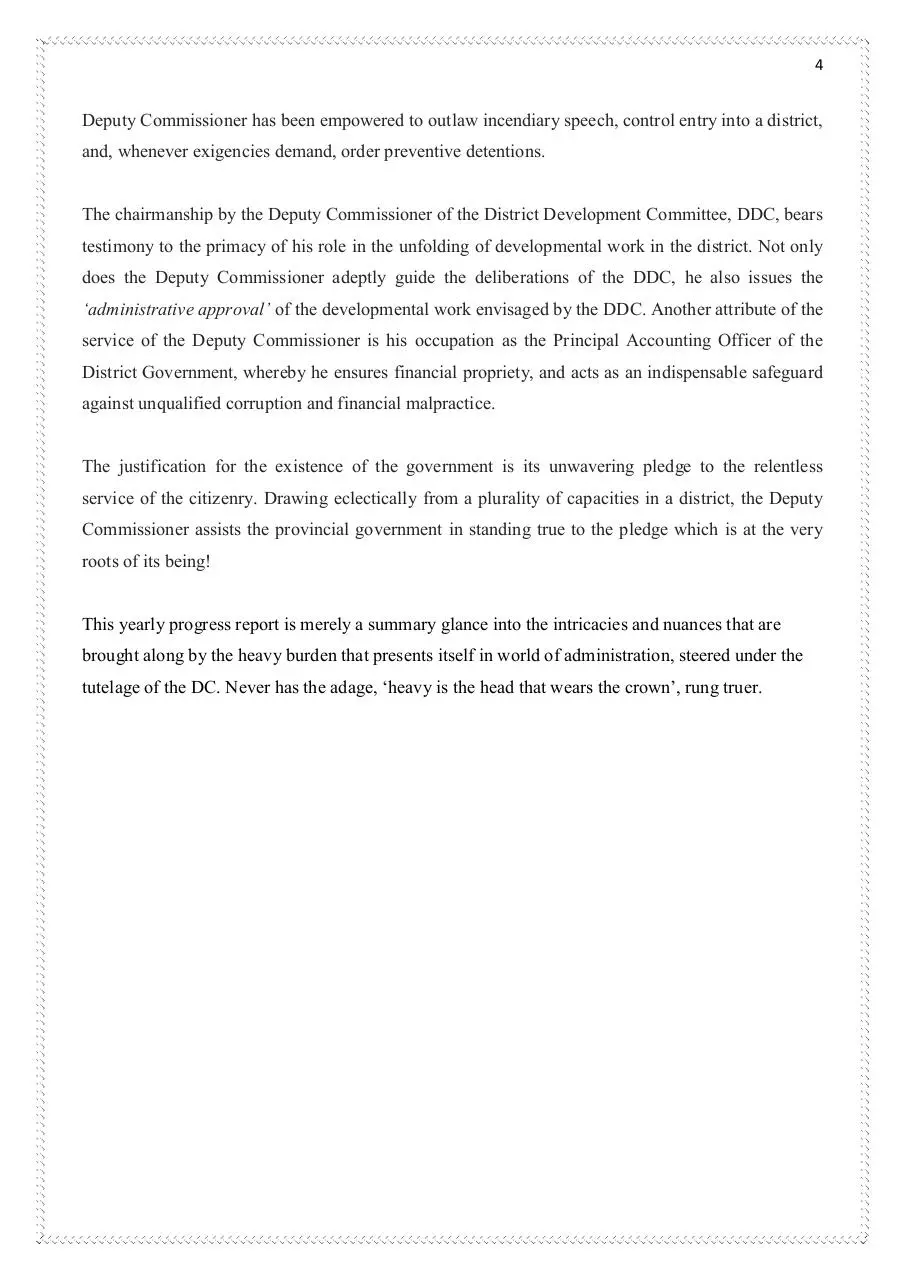Mardan Rising 2016 (PDF)
File information
Author: Shoaib
This PDF 1.6 document has been generated by Adobe Acrobat Pro 11.0.0, and has been sent on pdf-archive.com on 02/10/2017 at 16:35, from IP address 175.107.x.x.
The current document download page has been viewed 1096 times.
File size: 22.7 MB (72 pages).
Privacy: public file





File preview
O
t\'LLI
rs
Annual Report 2016
_
R AN.
R
IN.0
Deputy Commissioner Office Mordan
,..
.
,
1
DEPUTY COMMISSIONER’S MESSAGE
S
ublimity in administration ineluctably
demands farsightedness, administrative
acumen, and financial proficiency. The
acquisition of the office of a district administrator
is a sacred trust, the just execution of which
demands undivided attention, relentless effort,
and
impregnable
integrity.
As
district
administrator of Mardan, I and my team believe,
most firmly, that it is our fiduciary obligation to
take care of, and provide for, sundry needs of the
citizenry, whilst abiding by the canons of conscientious duty. Devoted to the end of excellence in
public service delivery, the Office of the Deputy Commissioner, Mardan, assisted by its resolutely
committed officers, continues to work around the clock to sustain harmony and efficiency in
administration within the district.
Seeing the Office of the Deputy Commissioner, Mardan, as an emblem of the provincial government,
the people of Mardan look towards it for an escape from their grievances, attributing to it the
capacity to resolve all of their worries. In awareness of the expectations resting within popular
consciousness, the limitation of the resources at its command notwithstanding, the Office of the
Deputy Commissioner, Mardan, leaves no stone unturned to keep alive the faith of the people of
Mardan in the abilities of the provincial government. I can affirm with great pride that, very often,
the office of the Deputy Commissioner, Mardan, succeeds in surpassing even the extent of the call of
duty, and helps all and sundry, regardless of class and creed.
By the grace of Almighty Allah, in the year 2016, the Provincial Government of Khyber
Pakhtunkhwa declared the District Administration, Mardan, as one of the most efficient and effective
district administrations of the province. Contributing to this declaration was the spirit of creative
innovation defining initiatives of the Administrative officers of Mardan, unprecedented in history of
governmental activity in the province. To these initiatives belong, among others: ‘Home Service
Delivery of Domiciles’ and ‘First Interaction of the Youth with Government: A Proactive Approach’.
2
The report which follows is a humble endeavor to give to its reader an insight into the multiplicity of
functions performed by the District Administration, Mardan. I wish that its reading will fill you with
pleasure. Lastly, I earnestly request you for your infinitely valuable feedback.
IMRAN HAMID SHEIKH, PAS
DEPUTY COMMISSIONER MARDAN
3
INTRODUCTION
A
t the vanguard of service of the people of Pakistan is the administrative entity of the
Deputy Commissioner, perennially acknowledged for its preeminence in the
administrative hierarchy of a district. Its genesis predates the creation of Pakistan, and its
enduring continuity speaks of its empirical significance. Enshrined in popular consciousness as the
fundamental instrument of governance, the Deputy Commissioner is the cardinal plank upon which
service delivery in a district rests. An acute comprehension of the importance of the Deputy
Commissioner demands appreciation of the multiplicity of his functions.
The administrative edifice upon which the State of Pakistan rests can broadly be bifurcated into two
parts. From the first emanate policies. The second devotes itself to the realization of the plural
aspirations enfolded by the policies created. At the level of a district, the Deputy Commissioner is
the chief architect of the implementation of the policies created at the provincial and federal echelons
of executive and legislature.
Endowed with financial and regulatory powers in realms of administration and development, the
Deputy Commissioner is the principal representative of the provincial government in a district.
Exercising, with undivided attention and earnest devotion, supervision over a vast array of
governmental endeavors in a district, the Deputy Commissioner is the proud custodian of the writ of
the State and the virtues of public service.
Upon the shoulders of the Deputy Commissioner rests the provision of sundry services in the
domains of education, health, agriculture, sanitation, and several other departments associated with
the welfare of the people under his jurisdiction. In addition to his symbiotic co-ordination with
aforementioned line departments, the Deputy Commissioner provides avenues for recreation and
enlightenment. He arranges, among others, distinct festivals, awareness campaigns, and diverse
edifying social activities.
The regulatory measures undertaken by a Deputy Commissioner entail, inter alia, the removal of
unwarranted encroachments and the controlling of price and quality of edibles, commodities and
drugs. Deriving powers from various local and special laws, the Deputy Commissioner acts as the
antithesis of adulteration and unlawful excesses. The sustenance of law and order in a district also
falls under the purview of the administrative actions of the Deputy Commissioner. To this end, the
4
Deputy Commissioner has been empowered to outlaw incendiary speech, control entry into a district,
and, whenever exigencies demand, order preventive detentions.
The chairmanship by the Deputy Commissioner of the District Development Committee, DDC, bears
testimony to the primacy of his role in the unfolding of developmental work in the district. Not only
does the Deputy Commissioner adeptly guide the deliberations of the DDC, he also issues the
‘administrative approval’ of the developmental work envisaged by the DDC. Another attribute of the
service of the Deputy Commissioner is his occupation as the Principal Accounting Officer of the
District Government, whereby he ensures financial propriety, and acts as an indispensable safeguard
against unqualified corruption and financial malpractice.
The justification for the existence of the government is its unwavering pledge to the relentless
service of the citizenry. Drawing eclectically from a plurality of capacities in a district, the Deputy
Commissioner assists the provincial government in standing true to the pledge which is at the very
roots of its being!
This yearly progress report is merely a summary glance into the intricacies and nuances that are
brought along by the heavy burden that presents itself in world of administration, steered under the
tutelage of the DC. Never has the adage, ‘heavy is the head that wears the crown’, rung truer.
5
DEDICATED TO SHAHEED ABDUL MANSOOR KAKAR
DEPUTY COMMISSIONER, QUETTA
OBITUARY WRITTEN BY SAAD S. KHAN, PAS:
PRIDE OF BALOCHISTAN
A
usual hot day of mid-June; and the usual rut of routine office work. In fact, there was
nothing unusual until I received a panic call from my wife, Sara, about a big terrorist
attack in Quetta, Balochistan. She had just watched live scenes from the aftermath of a
terrorist attack on Bahadur Khan Women University. In those days, even news of terrorist attacks
was no unusual either. But this one that had killed a score of girl students was unusual in its savagery
by any standards. In the ensuing engagement with the terrorists, the Deputy Commissioner Quetta,
had been among the martyrs. I and Sara had a special association with Balochistan, as I had started
my career in that province and had spent some very challenging years there. It was in Quetta that me
and Sara had met, got married and both our sons too are Quetta born. On top of it, both of us, rank
ourselves to be fiercely committed individuals towards female education and gender equality. The
attack in Balochistan, that too on females, in broad daylight in the only Women University of the
province--- all this was shattering our nerves. The fifteenth of June, the year 2013, has left indelible
scars on individual memory and national history.
6
Incidentally, her lone brother Fayyaz Ahmad Sumbal had been a Police officer in Quetta, and
obviously Sara was hysterically worried about the well-being of the brother as well. All TV channels
were reporting intense fighting around the Bolan Medical Center where the dead and injured girlstudents of Bahadur Khan Women University were being rushed and the terrorists had launched the
second attack there. I knew my batch mate Abdul Mansoor Khan was the Deputy Commissioner till
a couple of weeks ago, and I instinctively prayed to the Lord, that it would not be Mansoor. May be
he got posted out of Quetta and I did not know. I asked hesitantly if the television channels were also
giving the name of the Deputy Commissioner, hoping that some other name may be told. “I think the
name is Abdul Mansoor Khan” my wife responded crying. Her brother Fayyaz, she said, was leading
the police operation as per TV reports and Fayyaz’ mobile was not responding. “To the Lord we
belong and unto Him we shall return” I muttered in awe and shock and tried all my contacts for
locating Fayyaz now. It was an hour when we finally got confirmation that Fayyaz was alive and had
survived the volley of bullets by hair’s breadth in the incident. That Fayyaz would himself die within
53 days of this incident, in another terrorist attack, only the Providence could know at that time.
Why are the terrorists called Islamic extremists, I started wondering? What have they to do with
Islam, or with any religion, for that matter? Can the misogynist anti-education anti-civilization and
senseless murderers even be deemed human beings? These questions muddled in my mind with a
kaleidoscope of memories of our time together, myself, Mansoor and 18 other young officers, in the
Civil Services Academy (DMG Campus) on the Mall Road, Lahore, opposite the Governor House.
At the academy, a visiting senior CSP had once told, nay, foretold us that, proportionately speaking,
the members of the PAS had the highest likelihood of death in the line of duty--- higher than their
counterparts in uniformed security services or armed law enforcement agencies. With half way
through into our anticipated span of active service, three of us now dead, another three already quit
service, the remaining still quizzing about their own fate, the words echoed like prophetic!
Mansoor’s smiling face, however, would not go away from my mind. Mansoor was a simple man, of
modest background (his father being tailor master) and of humble beginnings (he started government
service as a clerk). By sheer mix of perseverance coupled with hard work, he qualified the Central
Superior Services (CSS) competitive examination in his third--- and technically the last--- attempt.
This time he topped merit from the province of Balochistan and got allocated against the lone seat
reserved for the prestigious Pakistan Administrative Service (the then-called DMG) for his province.
He was the first in his family to rise to be a PAS Officer and a day came that he became Deputy
Commissioner of his home town of Quetta. These laurels had not been seen by his family in
generations. He became a source of pride for even those who had a feint acquaintance with him.
7
It is the moral heights that he achieved that deserve pride of place in any narrative about him. In a
country where the salaries of public administrators are ridiculously low--- even by comparison to
their peers in country where national IQ levels are comparable to ours--- he was a pinnacle of
honesty and integrity. Had it not been a tragedy, the salary structure of the country’s top civil
servants could have suitably been characterized as a comedy. With opportunities of minting money
galore, this man owed Rs 60,000/- (a mere $560) to his friend which he borrowed from a friend as
late as in January of the year he lost his life to the terrorists’ bullets. Yes, incredible as it seems, he
did not even have sixty thousand when he needed the sum direly. Where the State places value of the
services of most promising among its sons at less than $560, it is only the moral superiority of their
character that induces them to lay down their lives for the motherland.
Mansoor was not targeted the first time. Since he led a mission in Pishin district neighboring the PakAfghan border, in which three terrorist were exterminated, he was on their hit list. He was unlike the
public servants who compromised on national integrity and started living under the shadow of
protection of terrorists. Yes, living on was easy in trouble-hit areas. All an administration or police
officer had to do was to offer unambiguous signals of looking the other way when a terrorists rule the
roost. If the terrorists start feeling unthreatened by the majesty of law, this provided, and still does,
an unwritten warranty of life to the officer concerned. This is a path taken by many officers;
Mansoor was definitely not one of them.
Being a son of soil, Mansoor loved his home province of Balochistan. He cherished his childhood
years when there was peace and tranquility in his homeland. He proved that life could be lived with
honor rather than in cowardice. He proved that even where State could nor protectits officers, there
were officers who protected the State. He led from the front. He laid down his life so that others may
live.
Mansoor proved time and again that it is only the stuff the leader is made of, that matters. Sometimes
the State wins sometimes the terrorists carry the day. In the heat of the moment it is only the quality
of leadership--- theirs or ours--- that determines the outcome on a given day. Mansoor was a born
leader. The previous year, while he was Deputy Commissioner of Khuzdar, his convoy was stopped
by a local Sardar—head of militia—who tried to snatch weapons from his guards. The under paid,
under equipped and under trained personnel of most of the law enforcement agencies are usually too
timid to offer a response. Mansoor could not see challenge to the State authority shattered on the
road right before his eyes. He alighted from his vehicle and shouted that before taking a single
weapon from the Police guard they will have to kill him first. The militants gave way and receded.
8
He would go to the Combined Military Hospital in Khuzdar and discuss at length with the army
officers about the future of the State and the future of Balochistan. It pained him to see all that was
happening around. He was soon to be elevated to the prized post of being the DC of the provincial
metropolis of Quetta--- a city where he was born and grew up.
In his initial months at his new posting as DC Quetta, there was the biggest twin suicide bombing of
the minority Hazara community. His beloved city turned read with the blood of eighty-six people
belonging to Shia sect. The Hazara community brought the coffins outside the Governor House and
staged a sit in to protest the brutality. They refused to bury the dead until the Government assured
them of their security. After 72 hours of stand-off, the Federal Government accusing the provincial
government of ineptitude dismissed the latter. The aggrieved community agreed to bury the victims.
The DC led the Police party for protection of the funeral rites at the mass burials. This was a place
where a direct firing was made on Mansoor. There was a complete chaos and mayhem. Nobody
could figure out who was firing at whom and why. Mansoor sheltered by a rock and continued giving
instructions to his personnel which was flashed all over the national hook up. He did not forget to say
“Allah kahair karega” (God will protect us!) to the worried near and dear ones who called to inquire
about him in the days following the TV footages of the event. He has escaped unhurt once more.
Within two months, a truck load of explosive hit the Official Mansion of the Inspector General of
Police (IGP) Balochistan who miraculously survived. The flying window glass in the adjacent
Deputy Commissioner House hit Mansoor who was working as always after office hours too, in the
bedroom, while watching television news, surrounded by his official files as always. This time he
survived, but with wounds.
A man with very strong belief in the Divine, he seemed never to be shattered with the close brush
with death, time and again. He decided to go to Mecca for pilgrimage (called Umrah) taking his old
parents along. The Ka’aba, or the House of God, the Muslims’ holiest place is believed to ensure
answers to one’s prayers. Little did Mansoor know that he would never see the Deputy
Commissioner House or office upon his return. God might have liked him too much and summoned
Mansoor to the heavens to be close to Him. Mansoor returned to Quetta after spending fifteen days in
Mecca. As the return flight landed at Quetta International Airport, and his phone began ringing even
before the taxying plane could make a complete stop. This is the life of a Deputy Commissioner--no private life, no time for respite, and always on the toes, protecting the state interests. No leave
rights, no rest rights, in other words, none of the labor rights. The call was from some superior in the
civil hierarchy. The interlocutor instructed him to rush to the Bahadur Khan Women University
Download Mardan Rising 2016
Mardan Rising 2016.pdf (PDF, 22.7 MB)
Download PDF
Share this file on social networks
Link to this page
Permanent link
Use the permanent link to the download page to share your document on Facebook, Twitter, LinkedIn, or directly with a contact by e-Mail, Messenger, Whatsapp, Line..
Short link
Use the short link to share your document on Twitter or by text message (SMS)
HTML Code
Copy the following HTML code to share your document on a Website or Blog
QR Code to this page

This file has been shared publicly by a user of PDF Archive.
Document ID: 0000680040.